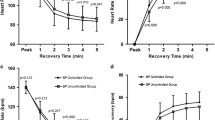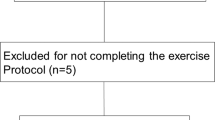Abstract
Introduction
The autonomic nervous system plays an active role in the regulation of early morning blood pressure (BP) and BP/pulse regulation in the treadmill exercise test (TET).
Aim
We evaluated the relationship between BP/pulse changes during TET and morning blood pressure surge (MS).
Methods
Patients who underwent ambulatory blood pressure measurement (ABPM) and TET in the same visit between 2017 and 2020 were evaluated retrospectively. Patients with previously diagnosed hypertension and/or using antihypertensives and office BP ≥ 140/90 were excluded from the study.MS values and dipping percentage were calculated from ABPM data. The patients were analyzed by dividing them into two groups according to the MS median, and BP/pulse values during exercise and recovery periods were compared in these groups.
Results
202 patients [median age 45 (39–51), male 134 (66.3%)] were included in the study. MS median was 18.5 (10.75–27) mmHg. TET recovery period 3rd-min systolic blood pressure (RSBP) was higher in the group with high MS (p: 0.017). Systolic and diastolic dipping percentages were higher in the group with higher MS (p: 0.015, p: 0.040, respectively). Peak systolic and diastolic BP, RSBP, and recovery 3rd min diastolic BP were positively correlated with MS (p < 0.05, for all). Additionally, an independent relationship was observed between RSBP and MS (β: 0.205, p: 0.028).
Conclusion
We found an independent association between RSBP and MS. Increased RSBP may be associated with target organ damage and cardiovascular events such as MS.
Similar content being viewed by others
References
Hering D, Kucharska W, Kara T, Somers VK, Narkiewicz K. Resting sympathetic outflow does not predict the morning blood pressure surge in hypertension. J Hypertens. 2011;29(12):2381–6.
Sheppard JP, Hodgkinson J, Riley R, Martin U, Bayliss S, McManus RJ. Prognostic significance of the morning blood pressure surge in clinical practice: a systematic review. Am J Hypertens. 2015;28(1):30–41.
Ye R, Liu K, Gong S, Li J, Xu Y, Chen X. The association between morning blood pressure and subclinical target organ damage in the normotensive population. J Hypertens. 2019;37(7):1427–36.
Luo Y, Wang YL, Wu YB, Xu Y, Head GA, Barry M, et al. Association between the rate of the morning surge in blood pressure and cardiovascular events and stroke. Chin Med J. 2013;126(3):510–4.
Li Y, Thijs L, Hansen TW, Kikuya M, Boggia J, Richart T, et al. Prognostic value of the morning blood pressure surge in 5645 subjects from 8 populations. Hypertension (Dallas, Tex: 1979). 2010;55(4):1040–8.
Amici A, Cicconetti P, Sagrafoli C, Baratta A, Passador P, Pecci T, et al. Exaggerated morning blood pressure surge and cardiovascular events. A 5-year longitudinal study in normotensive and well-controlled hypertensive elderly. Arch Gerontol Geriatr. 2009;49(2):e105–9.
Zhang P, Jin MY, Song XY, Wang Z, Jiang YH, Yang CH. Comparison of the antihypertensive efficacy of morning and bedtime dosing on reducing morning blood pressure surge: a protocol for systemic review and meta-analysis. Medicine. 2021;100(5):e24127.
Xie Z, Zhang J, Wang C, Yan X. Chronotherapy for morning blood pressure surge in hypertensive patients: a systematic review and meta-analysis. BMC Cardiovasc Disord. 2021;21(1):274.
Andreadis EA, Geladari CV, Angelopoulos ET, Kolyvas GN, Papademetriou V. Morning surge and peak morning ambulatory blood pressure versus automated office blood pressure in predicting cardiovascular disease. High Blood Press Cardiovasc Prev Off J Ital Soc Hypertens. 2019;26(3):209–15.
Kıvrak A, Özbiçer S, Kalkan GY, Gür M. Morning blood pressure surge and arterial stiffness in newly diagnosed hypertensive patients. Blood Press. 2017;26(3):181–90.
Cardoso CRL, Salles GF. Associations of the nocturnal blood pressure fall and morning surge with cardiovascular events and mortality in individuals with resistant hypertension. J Hypertens. 2021;39(6):1177–87.
Almas A, Sultan FT, Kazmi K. Increased level of morning surge in blood pressure in normotensives: a cross-sectional study from Pakistan. J Coll Physicians Surg Pak JCPSP. 2016;26(10):818–21.
Tanindi A, Ugurlu M, Tore HF. Blood pressure morning surge, exercise blood pressure response and autonomic nervous system. Scand Cardiovasc J SCJ. 2015;49(4):220–7.
Ellis K, Pothier CE, Blackstone EH, Lauer MS. Is systolic blood pressure recovery after exercise a predictor of mortality? Am Heart J. 2004;147(2):287–92.
Taylor AJ, Beller GA. Postexercise systolic blood pressure response: association with the presence and extent of perfusion abnormalities on thallium-201 scintigraphy. Am Heart J. 1995;129(2):227–34.
Tsuda M, Hatano K, Hayashi H, Yokota M, Hirai M, Saito H. Diagnostic value of postexercise systolic blood pressure response for detecting coronary artery disease in patients with or without hypertension. Am Heart J. 1993;125(3):718–25.
McHam SA, Marwick TH, Pashkow FJ, Lauer MS. Delayed systolic blood pressure recovery after graded exercise: an independent correlate of angiographic coronary disease. J Am Coll Cardiol. 1999;34(3):754–9.
Amon KW, Richards KL, Crawford MH. Usefulness of the postexercise response of systolic blood pressure in the diagnosis of coronary artery disease. Circulation. 1984;70(6):951–6.
Holmqvist L, Mortensen L, Kanckos C, Ljungman C, Mehlig K, Manhem K. Exercise blood pressure and the risk of future hypertension. J Hum Hypertens. 2012;26(12):691–5.
Thanassoulis G, Lyass A, Benjamin EJ, Larson MG, Vita JA, Levy D, et al. Relations of exercise blood pressure response to cardiovascular risk factors and vascular function in the Framingham Heart Study. Circulation. 2012;125(23):2836–43.
Wakamatsu Y, Takeda Y, Tanaka S, Yamamoto K, Yamashita S, Sugiura T, et al. Excessive blood pressure elevation upon awakening involves an exaggerated cardiac response to slight physical activity: a possible mechanism underlying the risk of “morning surge.” Blood Press Monit. 2012;17(5):198–203.
Levey AS, Stevens LA, Schmid CH, Zhang YL, Castro AF 3rd, Feldman HI, et al. A new equation to estimate glomerular filtration rate. Ann Intern Med. 2009;150(9):604–12.
Lang RM, Bierig M, Devereux RB, Flachskampf FA, Foster E, Pellikka PA, et al. Recommendations for chamber quantification: a report from the American Society of Echocardiography’s Guidelines and Standards Committee and the Chamber Quantification Writing Group, developed in conjunction with the European Association of Echocardiography, a branch of the European Society of Cardiology. J Am Soc Echocardiogr Off Publ Am Soc Echocardiogr. 2005;18(12):1440–63.
Kim D, Ha JW. Hypertensive response to exercise: mechanisms and clinical implication. Clin Hypertens. 2016;22:17.
Bombelli M, Fodri D, Toso E, Macchiarulo M, Cairo M, Facchetti R, et al. Relationship among morning blood pressure surge, 24-hour blood pressure variability, and cardiovascular outcomes in a white population. Hypertension (Dallas, Tex: 1979). 2014;64(5):943–50.
Kaypaklı O, Gür M, Harbalıoğlu H, Şeker T, Selek Ş. High morning blood pressure surge is associated with oxidative stress and paraoxonase 1 activity in newly diagnosed hypertensive patients. Clin Exp Hypertens (New York, NY: 1993). 2016;38(8):680–5.
Çoner A, Gençtoy G, Akinci S, Altin C, Müderrisoğlu H. Assessment of vascular inflammation and subclinical nephropathy in exaggerated blood pressure response to exercise test. Blood Press Monit. 2019;24(3):114–9.
Kario K, Shimada K, Pickering TG. Clinical implication of morning blood pressure surge in hypertension. J Cardiovasc Pharmacol. 2003;42(Suppl 1):S87-91.
Yilmaz S, Nar G, Til A, Kaftan A. Morning blood pressure surge and diastolic dysfunction in patients with masked hypertension. Blood Press Monit. 2020;25(3):121–5.
Okada Y, Galbreath MM, Shibata S, Jarvis SS, Bivens TB, Vongpatanasin W, et al. Morning blood pressure surge is associated with arterial stiffness and sympathetic baroreflex sensitivity in hypertensive seniors. Am J Physiol Heart Circ Physiol. 2013;305(6):H793-802.
White WB, Weber MA, Davidai G, Neutel JM, Bakris GL, Giles T. Ambulatory blood pressure monitoring in the primary care setting: assessment of therapy on the circadian variation of blood pressure from the MICCAT-2 Trial. Blood Press Monit. 2005;10(3):157–63.
Polónia J, Amado P, Barbosa L, Nazaré J, Silva JA, Bertoquini S, et al. Morning rise, morning surge and daytime variability of blood pressure and cardiovascular target organ damage. A cross-sectional study in 743 subjects. (Revista portuguesa de cardiologia : orgao oficial da Sociedade Portuguesa de Cardiologia) Port J Cardiol Off J Port Soc Cardiol. 2005;24(1):65–78.
Soylu A, Yazici M, Duzenli MA, Tokac M, Ozdemir K, Gok H. Relation between abnormalities in circadian blood pressure rhythm and target organ damage in normotensives. Circ J. 2009;73(5):899–904.
Williams B, Mancia G, Spiering W, Agabiti Rosei E, Azizi M, Burnier M, et al. 2018 ESC/ESH Guidelines for the management of arterial hypertension. Eur Heart J. 2018;39(33):3021–104.
Schultz MG, Otahal P, Cleland VJ, Blizzard L, Marwick TH, Sharman JE. Exercise-induced hypertension, cardiovascular events, and mortality in patients undergoing exercise stress testing: a systematic review and meta-analysis. Am J Hypertens. 2013;26(3):357–66.
Panza JA, Epstein SE, Quyyumi AA. Circadian variation in vascular tone and its relation to alpha-sympathetic vasoconstrictor activity. N Engl J Med. 1991;325(14):986–90.
Arai Y, Saul JP, Albrecht P, Hartley LH, Lilly LS, Cohen RJ, et al. Modulation of cardiac autonomic activity during and immediately after exercise. Am J Physiol. 1989;256(1 Pt 2):H132–41.
Rajalakshmi R, Nataraj SM, Vageesh V, Dhar M. Blood pressure responses to steady treadmill exercise in overweight and obese young adults. Indian J Physiol Pharmacol. 2011;55(4):309–14.
de Oliveira LS, Fontes A, Vitor ALR, Vanderlei FM, Garner DM, Valenti VE. Lower systolic blood pressure in normotensive subjects is related to better autonomic recovery following exercise. Sci Rep. 2020;10(1):1006.
Funding
This study was approved by Baskent University Institutional Review Board and Ethics Committee (Project no: KA21-463) and supported by Baskent University Research Fund.
Author information
Authors and Affiliations
Corresponding author
Ethics declarations
Conflict of interest
The authors declare that there is no conflict of interest
Rights and permissions
About this article
Cite this article
Akbay, E., Akinci, S., Coner, A. et al. Association of Morning Surge and Postexercise Heart Rate and Blood Pressure Recovery. High Blood Press Cardiovasc Prev 29, 253–261 (2022). https://doi.org/10.1007/s40292-022-00513-w
Received:
Accepted:
Published:
Issue Date:
DOI: https://doi.org/10.1007/s40292-022-00513-w




